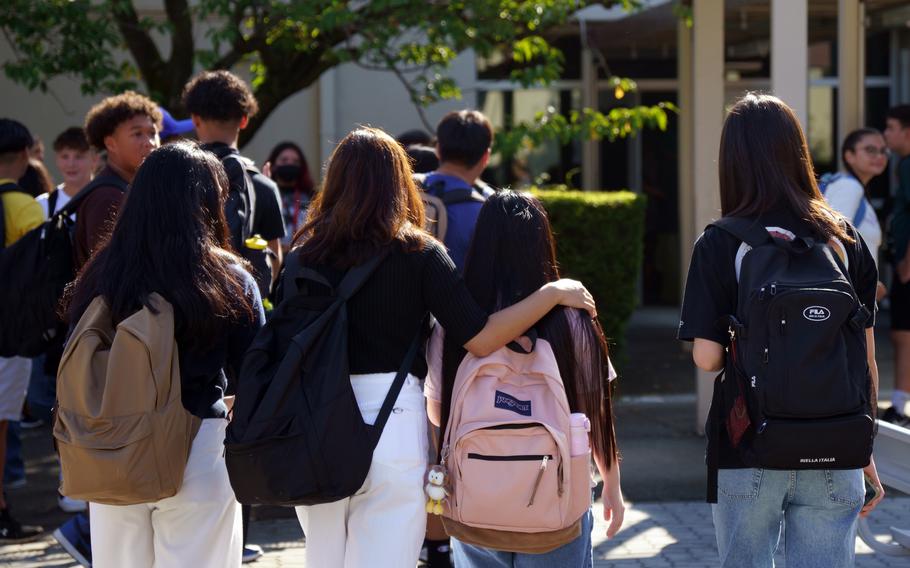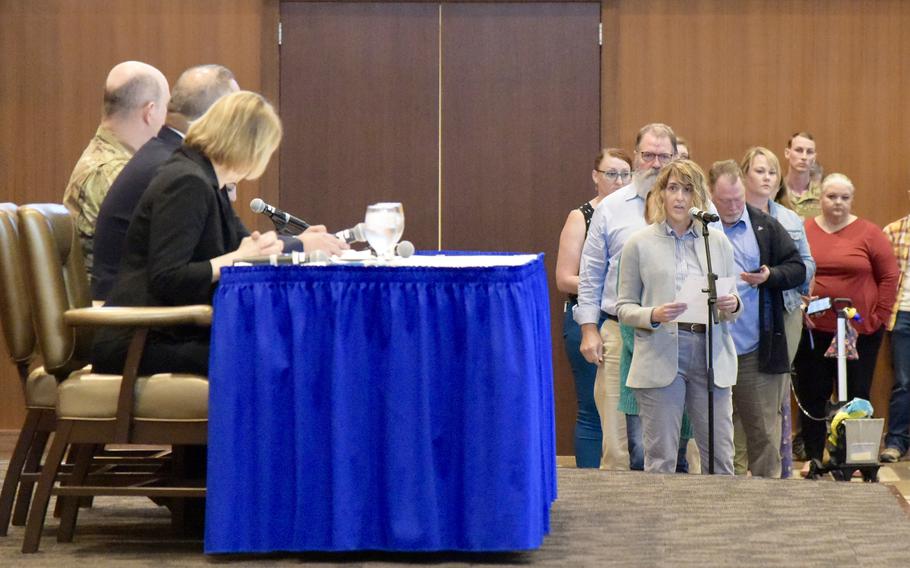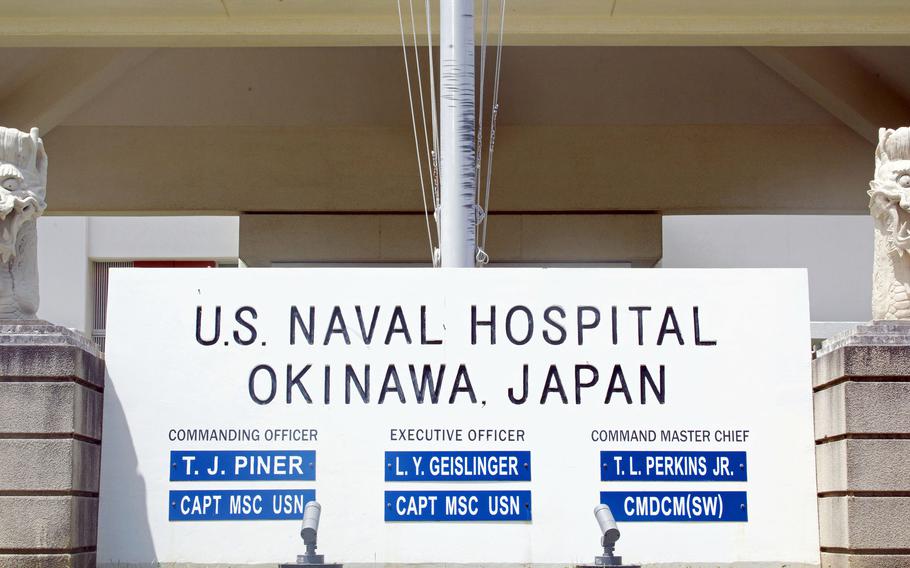
Students head to Zama Middle High School on the first day of classes at Camp Zama, Japan, Aug. 21, 2023. (Akifumi Ishikawa/Stars and Stripes)
YOKOSUKA NAVAL BASE, Japan — A loss of health care options for Defense Department civilians at U.S. military bases in Japan is prompting some teachers to resign, retire or relocate, according to the DOD school system and the teachers union.
Since last year, DOD civilians, including educators with Department of Defense Education Activity, have voiced a range of concerns about health care after military hospitals and clinics shifted from service-based commands to the Defense Health Agency.
Hundreds of people affected by the change complained to Pentagon officials during a series of town hall meetings throughout Japan in late January and early February. Many questioned whether a loss of on-base care would lead to staffing issues.
Now, at least a portion of DODEA’s nearly 3,000 employees in Japan are looking for a way out.
“The health care situation for DOD civilians in Japan has been a contributing factor for some employee resignations, retirements and relocations,” DODEA spokeswoman Miranda Ferguson told Stars and Stripes in a Sept. 19 email. “DODEA ensures prospective employees are aware of limited access to military medical and dental treatment facilities in Japan.”
Ferguson could not specify how many exiting teachers cited health care as a reason, as employees “are not required to provide the agency with this information during the offboarding process.”
However, she described the situation as a “serious issue” for civilian employees and DODEA.
The Federal Education Association — the Washington, D.C.-based teachers union that represents DODEA employees — indicated the problem may be pervasive.
“We are hearing that a majority of our members in Japan are planning to retire or seek employment elsewhere because of the lack of on-base health care,” FEA spokesman Gary Hritz said by email Oct. 11.
FEA represents more than 600 DODEA employees in Japan, and the departure of a significant percentage would “drastically undermine” the quality of education students receive on base, Hritz said.
“FEA educators, who are a key piece of the fabric of military quality of life and who provide unique and essential support to the students and community, need quality and readily accessible health care,” he added.

A woman asks a question about civilians' access to health care during a town hall meeting at Kadena Air Base, Okinawa, Feb. 1, 2023. (Stars and Stripes)
Space-available only
Military health care facilities began transitioning in 2018 from individual service commands, such as the Navy Bureau of Medicine and Surgery, to DHA administration. DHA, under federal law, is obligated to prioritize active-duty service members and their families.
Military hospitals will provide care for anyone not covered by the military’s Tricare Prime medical plan, including DOD civilians, contractors and their families, on a space-available basis.
DOD civilians are encouraged to find health care providers off base in Japan. Many have done so, but others complain of large upfront payments, a language barrier and the ability of Japanese providers to turn patients away, which has resulted in death.
As part of the transition, DHA audited facilities like Naval Hospital Yokosuka, where it found not enough appointment times were available for service members and their families.
About 4,000 of the 27,000 people attached to the base are not covered by any Tricare program, the hospital’s executive officer at the time, Navy Capt. Jenny Burkett, told a town hall audience at Yokosuka in September 2022.
The Japan Civilian Medical Forum, a grassroots advocacy group, says DOD civilians and their families in Japan number more than 10,000.
“We weren’t able to provide care to the people that we were tasked to care for, so we had to prioritize those people,” Burkett said at the town hall. “And that left civilians feeling that they weren’t getting health care.”
Over the next several months, civilians faced additional uncertainty.
DHA on Jan. 1 limited chronic care at base hospitals to Tricare Prime beneficiaries. DOD civilians, however, were limited to space-available appointments only for sudden onset or acute issues. Chronic problems — diabetes, for instance — had to be treated off base. By March 3, DHA reversed that decision.
Army Maj. Gen. Joseph Heck, formerly the DHA Indo-Pacific region director, wrote a memo instructing military hospitals to use “standard processes” to maximize the number of patients seen.
Advocates hailed the change as a win, but it left civilians unable to secure timely and reliable health care.

U.S. Naval Hospital Okinawa at Camp Foster is pictured on June 9, 2023. (Stars and Stripes)
‘Tough it out’
To better understand the situation, Stars and Stripes contacted numerous DODEA educators, most of whom declined to comment. Two teachers agreed to speak on condition of anonymity, citing fear of reprisal and medical privacy concerns.
A teacher at Yokota Middle School said she’s been unable to reliably secure specialist health care since the changes took effect.
“I have found that Yokota Air Base has tried very hard to work with us, and I’ve been able to get in there for minor things and to continue my prescriptions — that’s not my major concern at this point,” she said by phone Sept. 1.
“My major concern is emergency care and specialist care,” she said. “I would like to be able to see a cardiologist or another specialist, and that’s proven more difficult and more expensive.”
For an educator at Yokosuka’s Nile C. Kinnick High School, the major issue has been securing basic care outside of emergency visits.
“We’ve gotten emergency care when we needed it, but I tend to use it sparingly because I know people have been turned away by the ER,” she said by phone Sept. 1. “They’re being told, ‘That’s not an emergency; you need to go see your primary care physician.’ Well, we don’t have one.”
The Yokosuka teacher said she and her family have been left to just “tough it out” when faced with non-life-threatening injury or illness and that they “hadn’t had a physical in years.”
“I’d say that currently there’s a lot of lip service to appointments being available on a Space-A basis, but logistically it’s as difficult as it can possibly be,” she said.
Teachers are usually in class when same-day, space-available appointments are announced. At Yokosuka, for example, the hospital typically advertises them at 9:30 a.m.
“We can’t call till later, and frequently, there just aren’t any available appointments,” the teacher said.
DHA is committed to maximizing space-available care at military hospitals and thus far has made more appointments available at a “number of facilities” and expanded hours of operations, spokeswoman Whitney Trimble said by email Sept. 21.
Trimble said DHA “recognizes that every member of our military community is vital to mission success” and that the organization is working to improve appointment availability.
DHA also recognizes that “DODEA teachers are a “critical part” of the military community, but DOD civilians are being encouraged to “work with their respective human resource representatives or health insurance companies” to find information and alternative options, she said.
It may be too little, too late for some. The Yokosuka teacher, for example, is planning to leave.
“I’ve already been looking; I’m looking to move to DODEA schools in the States,” she said. “When I get the call, I’ll go. I don’t care where it is, I’m not being picky. We need to leave.”